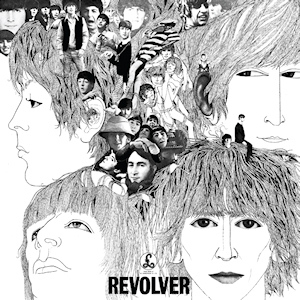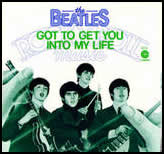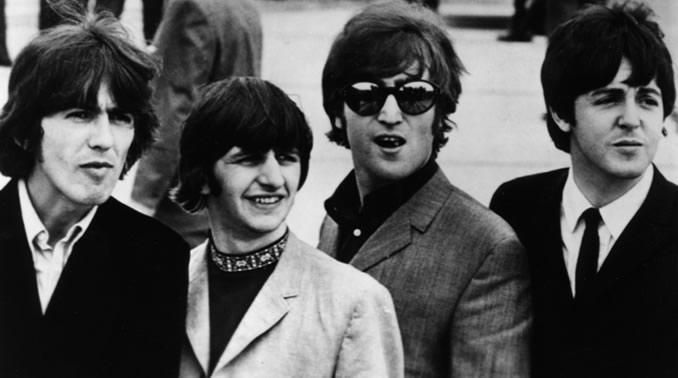Revolver by The Beatles
 As many times as I’ve heard someone say they love The Beatles, I have heard someone else say they think they are overrated. To a generation of listeners raised in the digital era, this lack of appreciation may be understandable. It is like trying to explain what people did to entertain themselves before every home had a television. The genius of the Beatles lies in their innovation. Their songs are tangible evidence of what was possible when you broke the rules of accepted songwriting styles and production techniques. What they produced nearly half a century ago on analog tape with limited tracks stands the test of time. It remains relevant even in today’s age of digital production, seemingly limitless tracks, and computer aided sound engineering.
As many times as I’ve heard someone say they love The Beatles, I have heard someone else say they think they are overrated. To a generation of listeners raised in the digital era, this lack of appreciation may be understandable. It is like trying to explain what people did to entertain themselves before every home had a television. The genius of the Beatles lies in their innovation. Their songs are tangible evidence of what was possible when you broke the rules of accepted songwriting styles and production techniques. What they produced nearly half a century ago on analog tape with limited tracks stands the test of time. It remains relevant even in today’s age of digital production, seemingly limitless tracks, and computer aided sound engineering.
Due to their unprecedented and phenomenal success, The Beatles had a license to kill. By the end of summer 1966, the band stopped touring all together. Their primary focus would be recording albums as the individual members settled into domestic life in England. While Rubber Soul, released in December 1965, kicked off the Beatles evolution from four mop tops playing simple guitar based pop/rock songs to ventures with ethnic instruments and a folk rock sound, Revolver pushed the band into a new direction with an eclectic mix of sounds spun together in unconventional ways that shouldn’t have worked. Not only did it work brilliantly, it laid the groundwork for the future of sound production. The album also marks the beginning of more individualistic styles in the band’s songwriting. Like in the past, most of the songs are credited to “Lennon/McCartney”, but on Revolver the songs are more distinctly Paul McCartney or more distinctly John Lennon.
Before getting into the nuts and bolts of this review of Revolver, it is important to realize that there were two different versions of this album. It was customary at this point in the international music business to release a UK version of an album as well as an altered US release with less songs and jumbled sequence. Revolver was not released in the US in its present form until the release of the digital CD in 1987. This was when it was settled that the UK versions were the “official” Beatles albums, so this is the version we have reviewed.
 Revolver by The Beatles |
|
|---|---|
| Released: August 5, 1966 (Capitol) Produced by: George Martin Recorded: Abbey Road Studios, London, April-June, 1966 |
|
| Side One | Side Two |
| Taxman Eleanor Rigby I’m Only Sleeping Love You To Here, There, and Everywhere Yellow Submarine She Said, She Said |
Good Day Sunshine And Your Bird Can Sing For No One Doctor Robert I Want to Tell You Got to Get You Into My Life Tomorrow Never Knows |
| Band Musicians | |
| John Lennon – Guitars, Piano, Organ, Synths, Vocals Paul McCartney – Bass, Guitar, Piano, Percussion, Vocals George Harrison – Guitars, Sitar, Percussion, Vocals Ringo Starr – Drums, Percussion, Vocals |
|
The album kicks off with George Harrison’s “Taxman”, inspired by the shockingly high income taxes paid by the band and other high earners in Great Britain – sometimes as high as 95%. It is a political song that takes a direct shot at Harold Wilson, the British Labour Prime Minister, and Edward Heath, Britain’s Conservative Leader of the Opposition. This was a very bold move for the times. Like “Taxman”, there are several straight-forward rock/pop songs on Revolver, molded in the Beatles’ mid-60s, “Swinging London” style. These include Lennon’s guitar driven “And Your Bird Can Sing” and “Doctor Robert”, and McCartney’s uplifting “Good Day Sunshine”. But the heart of the album is built from multiple unconventional songs.
“Eleanor Rigby” consists of layers of strings and vocals. The stark instrumentation and arrangement set the scene perfectly for the tale of the ‘lonely people” in the song. It is noteworthy that this is a song where no Beatle plays any instrument, just McCartney’s lead locals and backing vocals by the other band members. The music is driven by a string octet arranged by producer George Martin. McCartney also wrote “For No One”, a mellow song featuring the writer playing clavichord and a famous horn solo played by guest Alan Civil, and “Here, There, and Everywhere” which showcases his knack for writing and arranging stunningly beautiful melodies.
 McCartney’s “Got to Get You into My Life” was influenced by the Motown sound with extensive use of brass. The song was not released as a single in the US until 1976, ten years after Revolver and six years after the Beatles disbanded, and amazingly, it became a top ten hit at that time. Harrison’s “Love You To” is a nod to his fascination with Indian music featuring the sitar front and center, which was used previously on “Norwegian Wood” from Rubber Soul, but is more famously used here. Harrison’s third and final composition on the album is the piano-driven “I Want To Tell You”, a far more traditional song with lyrics about his difficulty expressing himself.
McCartney’s “Got to Get You into My Life” was influenced by the Motown sound with extensive use of brass. The song was not released as a single in the US until 1976, ten years after Revolver and six years after the Beatles disbanded, and amazingly, it became a top ten hit at that time. Harrison’s “Love You To” is a nod to his fascination with Indian music featuring the sitar front and center, which was used previously on “Norwegian Wood” from Rubber Soul, but is more famously used here. Harrison’s third and final composition on the album is the piano-driven “I Want To Tell You”, a far more traditional song with lyrics about his difficulty expressing himself.
John Lennon wrote “I’m Only Sleeping”, an odd stroll through a state (most likely drug induced) between being awake and being asleep. The backwards guitars add to the confused and muddled feeling of John Lennon’s vocals. “She Said, She Said” includes lyrics taken almost verbatim from a conversation between Lennon and actor Peter Fonda while they were under the influence of LSD in California in 1965. During a conversation, Fonda said “I know what it’s like to be dead,” because as a boy he had almost died from a self-inflicted gunshot wound.

The most groundbreaking song on this album from a technical aspect is the psychedelic final song, “Tomorrow Never Knows”. The lyrics were inspired by Timothy Leary’s book, “The Psychedelic Experience: A Manual Based on The Tibetan Book of the Dead”. Musically, the drone-like song included such groundbreaking techniques as reverse guitar, processed vocals, and looped tape effects. The elaborate recording, which included several simultaneous tape machines and creative processing of Lennon’s vocals, was conducted by engineer Geoff Emerick.
The light and childlike “Yellow Submarine” was written to provide Ringo Starr his token lead vocal for Revolver. With the help of all band members and the Abbey Road production team, overdubbed stock sound effects from the studios’ tape library were used to add the memorable soundscape to this famous song.
Revolver is considered by many critics to be one of the top albums of all time. It marked the beginning of the second half of the Beatles’ career, when they produced a string of highly influential, classic albums right up to the very end of their storied run.
~
Part of Classic Rock Review’s celebration of 1966 albums.





May 27, 2014 @ 11:13 am
Thanks for the great review of Revolver. It is interesting to learn the ins and outs of who did what and the technicalities of the production.
As far as the album’s place in music history, I would agree that it marked a break from the past Beatles albums. The irony is, for many of us who were young and Beatles fans (I was 12-13 at the time), it also marked the transition for us from pop to psychedelia. Essentially, Revolver led us to “heavier” music. We became hippies and left our Beatlemania behind. It set the stage for Hendrix, Cream, the Jefferson Airplane, the Moody Blues, Love, etc. We never looked back. By the time Sargent Pepper came out we were on to other things. For me and many others, Revolver was a catalyst to our musical maturity.
The Beatles Prior To “Revolver” | alexmarston
October 5, 2014 @ 9:17 pm
[…] Albano, K. (2011). Revolver by The Beatles. Classic Rock Review. Retrieved Oct. 5 2014 from https://classicrockreview.com/2011/09/1966-the-beatles-revolver/. […]
January 27, 2016 @ 9:25 pm
In my opinion, ‘Revolver’ (the UK version, as it was meant to be) is the Beatles’ second greatest album, second only to the UK version of ‘Rubber Soul’. Songwriting-wise, ‘Rubber Soul’ is a little deeper and shows more emotion. However, ‘Revolver’ does represent the greatest work that Paul McCartney ever contributed to a Beatles album. “Here There and Everywhere” and “For No One” are beautiful ballads that are touching rather than syrupy, “Eleanor Rigby” is strikingly moving and sympathetic, “Got to Get You Into My Life” is a Stax/Volt soul tribute that can’t be bettered, and “Good Day Sunshine” recalls the Lovin’ Spoonful’s “Daydream”. Paul was at his peak on this record. Lennon’s songs are also excellent, but McCartney really shines big time.
Sooo…what keeps this from being the very best Beatles album ? Two songs – “Love You To” is the first of Harrison’s many dreary, Hindu-influenced sitar mantras and “Yellow Submarine” is an annoying Ringo, kiddie sing-along that simply doesn’t fit in with the high standard of most of the rest of the songs. I love George’s contributions when he stays away from tha Hare Krishna stuff, and crap like “Yellow Submarine” and “Octopuss’ Garden” (from ‘Abbey Road’) are like putting blots on a pristine artwork.
One of the really great things about ‘Revolver’, besides the songwriting, is the production flourishes, which hold up better than those used on ‘Sgt. Pepper’. The multi-tracked guitars on “And Your Bird Can Sing” and “I’m Only Sleeping”, the backwards tape loops, drums and chanting on “Tomorrow Never Knows” and the fuzz-toned guitar solo on “Taxman” remain stunning and evocative of a recording era where anything was possible when creativity was high. Many bands may have taken their cue from ‘Revolver’ and pushed psychedelia to new extremes, but few (if any) ever displayed the songcraft that seems so effortless as it does here.
October 23, 2017 @ 2:12 pm
This is their best. Abbey Road was another peak, but much of it was lyrically thrown away. Pepper is the most overrated album of the decade.